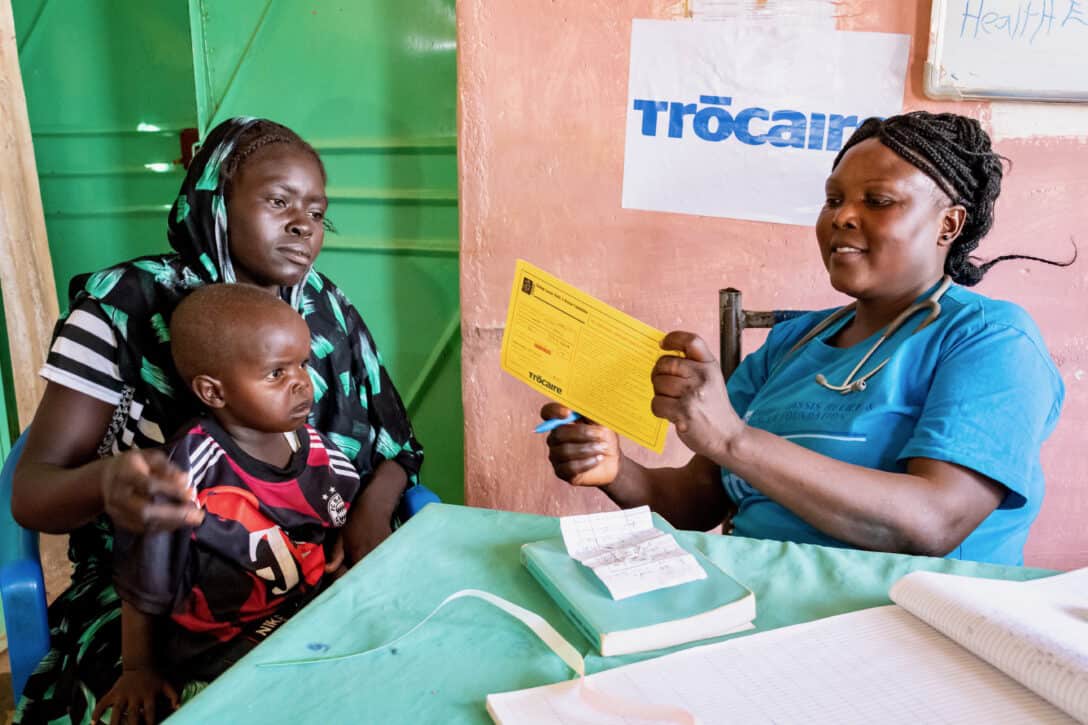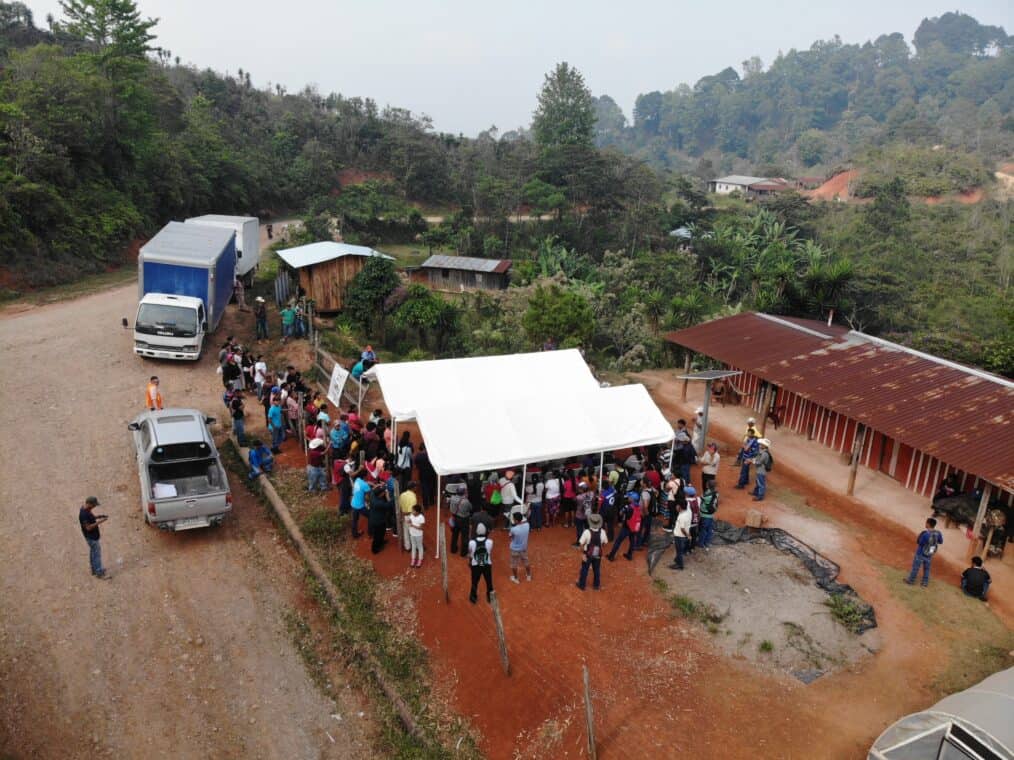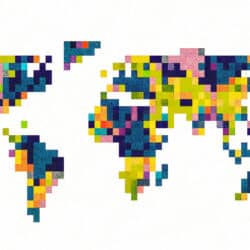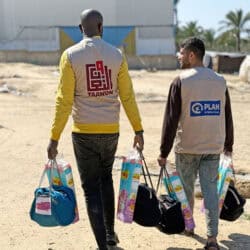Recent international aid cuts follow the deadliest year on record to be an aid worker. We must share the stats, the stories, and the situations we see, Canadian Foodgrains Bank’s Christina Philips writes, to compel more people to join this movement of compassion and care.
Mister Rogers, the famous children’s television host, stated, “My mother would say to me, ‘Look for the helpers. You will always find people who are helping.’ To this day, especially in times of disaster, I remember my mother’s words, and I am always comforted by realizing that there are still so many helpers – so many caring people in this world.”
If you look around today, you will see good-hearted people rising to be the helpers. However, in the international aid and development world, being a helper is becoming increasingly difficult as many Western governments reduce their support for humanitarian assistance – some to a drastic degree.
These cuts to international aid started happening in early 2025 – despite 2024 being the deadliest year on record to be an aid worker, as 284 people lost their lives. It’s easy to keep count of how many people died in the line of duty but much harder to track the emotional, mental, and spiritual toll these helpers pay. As organizations that show up during times of crises lay off their workers after funding cuts, and the need for assistance increases, the personal and emotional cost paid by those providing help will only continue to grow.
As organizations that show up during times of crises lay off their workers after funding cuts, and the need for assistance increases, the personal and emotional cost paid by those providing help will only continue to grow.
Recently on a trip to East Africa, I met with some of the organizations funded through Canadian Foodgrains Bank and our members. Foodgrains Bank is made up of 15 members that are churches or church-based organizations, and as a network, we come together to focus on ending global hunger. The programs are implemented by our members’ partners, who are locally based in the countries and communities where they are working.
The reasons for hunger are complex, and in so many of the places we work, the drivers of hunger are layered upon each other. Conflict continues to be the number-one reason that people go hungry in our world, but impacts of climate change, broken food systems, and poverty are also driving hunger. And none of these factors seem to be lessening – in fact, it is the opposite. Yet, in the midst of these challenges, there are individuals who remain committed to serving in any way they can.

In Nairobi, I met Mary Wamuyu, who works for Trócaire Sudan. Her organization is supported by Foodgrains Bank member Development and Peace – Caritas Canada. Although on maternity leave, Wamuyu joined our meeting – moved by the suffering of the Sudanese people, who remain close to her heart and in her prayers. She shared about a clinic Trócaire supports that is providing care to malnourished children.
As she talked about Muriabi, a little boy she had met at their clinic, her brow furrowed with concern and her eyes sparked with compassion. Despite being eight years old, Muriabi looked closer to four because of malnutrition. This was last summer, and Wamuyu rejoiced as she spoke about how, with support from their clinic’s services, this lethargic child has returned to being talkative, engaging, and healthy.
What worries Wamuyu now is that while her organization focuses on children who are malnourished, there were three other organizations working in the same area that had been providing food for hundreds of families living with hunger. Those organizations were supported by the US Agency for International Development (USAID) and had their funding cut, so as the next “lean” season approaches, those helpers will no longer be there – and neither will the emergency food they provided.
It made Wamuyu wonder how many more malnourished children would be knocking on their clinic’s door. And it made me wonder how the people who work in that clinic daily will respond to the increased knocks on their door. Will each knock feel like a weight further crushing them as they look at their diminishing supplies?
The week after I visited with Wamuyu, I sat in Aweil, South Sudan, as Bishop Joseph Mamer Manot talked about feeling unseen. He leads the non-profit Christian Initiative for Restoration and Development Agency, which works in the state of Northern Bahr el Ghazal, with support from our member Tearfund.
This work is hard, and sometimes, it feels like nobody sees us.
Joseph Mamer Manot, Christian Initiative for Restoration and Development Agency
Manot and his team serve people living with severe poverty. And at times, they must turn others away. As he sat in his chair, shoulders slumped, eyes looking at the floor and his voice filled with fatigue, it was clear that the hunger of his neighbours was a burden Manot carried. “This work is hard,” he said, “and sometimes, it feels like nobody sees us.”
How often do people who live with poverty feel invisible? The immense pressure to figure out the “hows” – how to find food, how to find work, how to provide shelter, how to survive the droughts, the floods, the poverty. This pressure is felt by the helpers, particularly those who work in front-line service. Listening to an untold number of stories of suffering and pain is difficult, even when they’re not about life and death. Meeting people in their darkest hours, during times of starvation, is an emotional burden that is hard to carry.

As organizations let workers go because of funding cuts, the compassionate, hard-working people who continue to serve will be asked to bear even more, and we must not abandon them.
But we, too, must proceed with self-compassion, vigour, and passion for this work. Because this pressure is also felt by the helpers in places like North America, who are supporting these front-line workers from a distance. Reading reports lined with statistics of how many people are suffering and how many can be helped, compared to how many will be left “behind,” can leave your mind constantly wondering how to do more. Listening to the story of a parent losing hope for the future because they don’t know how they’ll be able to feed their family after spending days on foot to escape a war can leave your heart broken. And wondering why the global community isn’t paying attention to some of the most desperate situations in the world can fill you with feelings of despair, anger, frustration, and sadness.
As helpers in the international development sector, we must take the time to mourn and grieve. However, we must also hold on to the moments of joy and hope when we hear stories of success – choosing to celebrate when food can be provided in refugee camps, to cheer when people are given a safe place to stay, and to rejoice when a once malnourished child now has the energy to run to their parents with a smile on their face. Every life saved is worth celebrating. And then we must move forward with purpose – because the cost is too high not to. If we don’t act, it means more of the world’s most vulnerable people will lose their lives.
It’s crucial that we continue raising funds to help provide for as many individuals in need as possible.
For those of us guided by faith, let’s make sure we don’t lose it in these dark times. For those who believe in a higher power, it is essential that we continue to pray for people suffering through deep poverty, hunger, and war, and the helpers that are serving them. For those who don’t have a religious or spiritual practice, the call to move with faith that together we can build a better world is needed just as much.
And faith requires action, so instead of giving in to despair, we must raise our voices to fight for the lives of people who are often “unseen,” rallying the support of compassionate people and asking our governments to help us build a better world by doing more. It’s crucial that we continue raising funds to help provide for as many individuals in need as possible. And we must continue to share the stats, the stories, and the situations we see, to compel even more people to join this movement of compassion and care.
We are the community of helpers – and it is time to stand firm in our posts.


